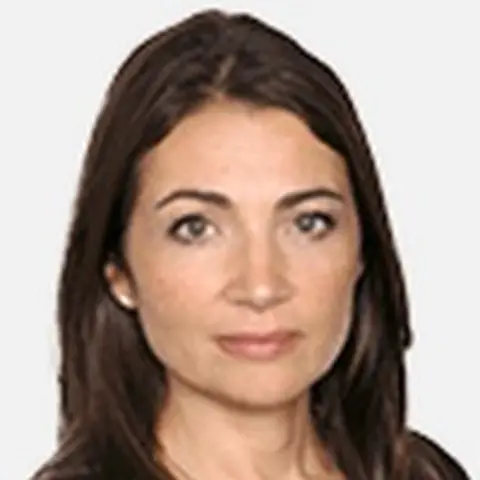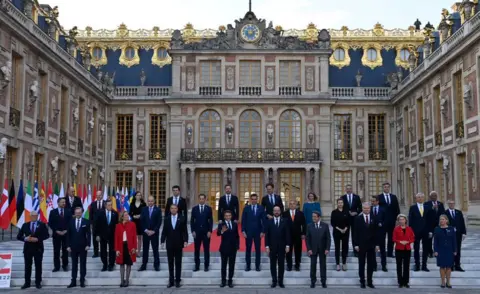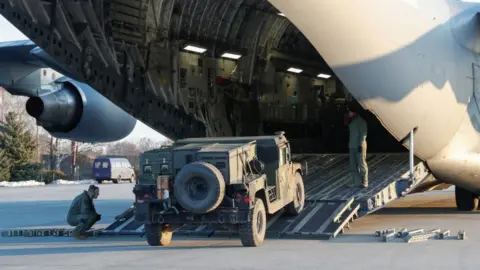Emotions high as EU leaders face up to Putin's war

 Getty Images
Getty ImagesThe opulent Palace of Versailles was designed by the kings of France to impress the outside world, yet by the time of the French Revolution it had turned into a glaring symbol of royal failure.
Now EU leaders who are here for a two-day summit hope to project an image of unity in the face of Russian aggression in Ukraine.
That's easy when they discuss the big picture.
But some details up for debate are clearly divisive amongst member states: such as energy prices impacted by the war, EU common defence plans and the enlargement of the bloc to include Ukraine.
Yet the bureaucratic, often bickering behemoth that is the EU has already been transformed by the Russia-Ukraine crisis. Let's take a step back to get some perspective:
- Germany is re-booting its military after decades of squeamishness due to the country's role in World War Two
- The EU has slapped unprecedented financial sanctions on Russia, despite costs to European businesses
- The EU's Temporary Protection Directive has been used for the first time to help Ukrainian refugees work and live in the bloc- a divisive topic during the 2015 migrant crisis
- Brussels is buying and supplying weapons for the first time ever to a country at war
- The Energy Transition - so often put on a backburner by EU countries - promises to be a revolution with new plans to reduce heavy reliance on Russian gas
- EU outliers Poland and Hungary, in Brussels' bad books for years, are back in the fold as a result of the current crisis
- Brussels' cooperation and co-ordination with Nato and the US are smoother and closer than they've been in a long time
Is this a temporary blip, or are we looking at a Brussels rebirth; an EU 2.0?
The EU was already aware - certainly after the 2016 Brexit vote, if not before - that it needed some serious self-improvement.
The bloc was awarded the Nobel Peace Prize back in 2012 "for over six decades contributing to the advancement of peace and reconciliation, democracy and human rights in Europe".
 Reuters
ReutersBut in the eyes of many Europeans, Brussels became seen as a home for neo-liberalism, rather than liberalism. A promoter of trade deals prioritising big business, and a maker of dirty migrant deals (with Turkey, for example) to keep refugees from reaching EU shores.
A bloc that, along with many national governments, was perceived as helping banks instead of families after the 2008 economic crisis. An entity, decades after the Second World War, that had lost its vision, mission and recognition as a force for peace in Europe.
Populism, nationalism and illiberalism became familiar faces in European politics, as voters looked for "a better fit". EU countries fell out over migration, eurozone reform and more.
Conspiracy theories flourished, as trust in Brussels and traditional politicians waned. "Strongman" leaders like Hungary's Viktor Orban, Turkey's Recep Erdogan, America's Donald Trump and Russia's Vladimir Putin were increasingly admired.
Then, in 2020, the Covid pandemic prompted a reset.
After an unedifying start, Brussels was perceived as working in the public interest. Member states seemed more united, opinion polls were approving.
The EU's Foreign Policy Chief, Josep Borrell, has appealed to EU leaders to display the same drive and resolve shown in face of Covid when dealing with the Russia-Ukraine crisis and resulting challenges.
This war on European soil has refocused EU minds as to what the bloc could - or should - stand for. Vladimir Putin's assault on Ukraine is also seen by the EU majority as a geopolitical attack on European security as a whole.

But this two-day informal summit could well expose cracks in this new-found EU unity.
All EU leaders fret about rising energy costs and the impact back home of Russia sanctions and possible counter sanctions. But they disagree on what to do about it. Some call for an EU-wide solution - that is, new funds from Brussels. Others, like Germany and the Netherlands, say no.
Emmanuel Macron is the host of the summit, since France currently holds the rotating EU presidency.
He's long been a champion of a stronger, more independent Europe, weaning itself off food, technology and energy imports and building up its own defence force to work alongside Nato.
But the prospect of a European Army (under French command) remains an unlikely prospect.
Instead, EU countries will discuss better co-ordination and the pooling of military resources... while likely arguing over which nations should win the best contracts.

As for migration. two million Ukrainians have already fled the country. Depending on how long the misery and violence continue, many more could arrive in the EU. Diplomats I've spoken to predict that funding, housing and relocating millions across different member states could yet prove difficult, longer term.
Right now though, the scenes of suffering and loss in Ukraine mean emotions are running high amongst EU leaders.
Their debate over whether Ukraine's application for EU membership can be fast-tracked, as a symbol of solidarity, looks to be the most heated Versailles Palace will witness this week.

War in Ukraine: More coverage
- LIVE: Latest updates from on the ground
- GERMANY: Putin's war prompts Scholz's dramatic U-turn
- OCCUPIED CITY: 'We are not co-operating'
- RUSSIA MOTHERS: 'How do I get my soldier son back?'
- EXPLAINED: Why Putin has invaded Ukraine?
- IN DEPTH: Full coverage of the conflict

